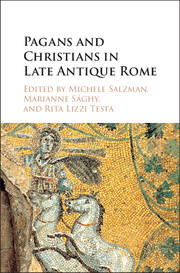 Pagans and Christians in Late Antique Rome
Pagans and Christians in Late Antique Rome from Section A - Pagans and Religious Practices in Christian Rome
Published online by Cambridge University Press: 05 November 2015
The subject of this chapter is a poem transmitted only under a cumbersomely descriptive title, the Carmen ad quendam senatorem ex christiana religione ad idolorum seruitutem conuersum (henceforth, Carmen). At eighty-five hexameter verses, it is the shortest of the three closely but indirectly related Latin hexameter satires on paganism to survive from late antiquity, and has been the least studied of the three, having neither the reflective expansiveness of the Poema Ultimum (which is three times its length) to commend it nor the exhilarating nastiness that drives the Carmen Contra Paganos. Like the latter's withering attack on a recently dead prefect, it too is addressed to a Roman aristocrat identified by an office rather than a name: “Who will not mock you,” the poet asks, “who have been consul, that you are now a servant of Isis?” However, his mockery is fitful, and between and beyond his bursts of abuse he offers extensive passages of earnestly platitudinous concern. But throughout, and in contrast to the other two poems, he presents himself engaging with his interlocutor and seeking to make him change his ways. He introduces himself at the outset as a long-standing acquaintance of the senator, shocked at the latter's defection but eager to offer salutary correction; he confronts him with his delinquencies and berates him for his stupidity; and he signs off apparently satisfied that he has achieved his purpose. It is this sustained engagement that will be the principal theme of this chapter, which will suggest a social and cultural context for the exercise; the method will be one of close reading of the poem, and an attempt to identify the poet's argumentative strategy.
The poem survives in four independent manuscripts, two poetic miscellanies and two collections of works by Cyprian. Cyprian is credited with authorship in all three of the manuscripts to offer an ascription, but a recent attempt to claim it for the martyr-bishop of Carthage fails to convince. Christianity is comfortably in the ascendant in the poet's world, where a former consul's natural home is within the Christian community, and his defection is an embarrassment rather than a catastrophe; nor is there any hint that in apostatizing he is allying himself to persecutors.
To save this book to your Kindle, first ensure [email protected] is added to your Approved Personal Document E-mail List under your Personal Document Settings on the Manage Your Content and Devices page of your Amazon account. Then enter the ‘name’ part of your Kindle email address below. Find out more about saving to your Kindle.
Note you can select to save to either the @free.kindle.com or @kindle.com variations. ‘@free.kindle.com’ emails are free but can only be saved to your device when it is connected to wi-fi. ‘@kindle.com’ emails can be delivered even when you are not connected to wi-fi, but note that service fees apply.
Find out more about the Kindle Personal Document Service.
To save content items to your account, please confirm that you agree to abide by our usage policies. If this is the first time you use this feature, you will be asked to authorise Cambridge Core to connect with your account. Find out more about saving content to Dropbox.
To save content items to your account, please confirm that you agree to abide by our usage policies. If this is the first time you use this feature, you will be asked to authorise Cambridge Core to connect with your account. Find out more about saving content to Google Drive.